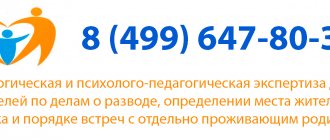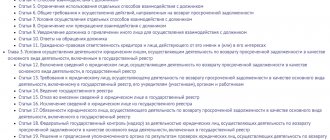Trade workers and a small number of buyers who were specifically interested in this were aware of this. It will be useful for everyone to know about what and how everything that happens is regulated when a consumer just enters a store to make a purchase and when he leaves, having received cash for his return or exchanging the purchase for any product. Some not-so-scrupulous sellers take advantage of the client’s ignorance, just as not-so-honest buyers are always looking for ways to circumvent the law. What if the seller doesn’t know him well and manages to deceive him. It is assumed that the buyer will always and without exception be right in everything, but there are certain nuances that protect the seller as well.
Description of parts of the return order
Article 55 of the law on the protection of consumer rights stipulates the key points of any sale and further probable return of various products, including small arms, bladed weapons, jewelry and other jewelry, as well as the return of each type of product. At the end there is a list of those products that under no circumstances can be returned or they have some special features for exchange.
The resolution consists of sixteen parts:
- The first includes general provisions, that is, it explains who developed these rules. Definitions of the entrepreneur and the consumer are given, it is stipulated who sets the operating hours, assortment, etc., the responsibilities of the seller, which explains the need for documents for the sale of specific goods, etc. It is also mentioned that the consumer always has the right to refuse services when the goods sell, and insist that the cash be returned if the service has already been provided without his consent.
- The following stipulates the specifics of the sale of all food products, in addition, the requirements for their appearance and display in the window, as well as the standards for the design of packaging and labels.
- The third part is about sales of various textiles, shoes for adults and children, and furs. Knitwear and an assortment of modules for sewing.
- The fourth deals with the important details of the sale of ordinary household appliances, such as a toaster, and the established procedure for providing or not providing various assembly services and their payment.
- The fifth relates to perfumes and cosmetics. Specifies all the features of their sale, methods of quality control by type of packaging and counting of goods individually. It is also separately stated that the seller must always introduce the client to the smells of available toilet waters, any colognes and all perfumes.
- The sixth deals with the trade in a variety of cars and equipment of this type. These rules are quite different from all the others.
- The seventh is about jewelry and other jewelry. It is separately stipulated that the label must indicate if some of the stones in the product are unnatural. It is also indicated that special certificates are required for cut stones.
- The eighth is dedicated to medicines, everything related to medicine, and in general a full range of pharmacies.
- The ninth talks about sales of various plants and pets, and indeed all animals. Including the fact that certain types of them require special permission under any circumstances.
- Use of chemicals to control rats and other pests in the home. Particularly noted is the need to have the date and number of the certificate of compulsory state registration on the package or box.
- Immediately following it is a section regulating the trade in all kinds of pesticides and other dangerous chemicals used in agronomy.
- Next, we consider everything related to the sale of authorized films on video cassettes and discs (cassettes, since the section was introduced in 1998, and then video cassettes were still in use, and then this concerned most of them). Including the fact that the seller must know everything about every film presented in his store.
- The section concerns the sale of weapons and all related goods. This includes the Federal Law “On Weapons,” which is the main set of rules for trade here.
- The fourteenth and smallest section stipulates the moment who controls that all the rules of Art. 55 were fulfilled. This is the responsibility of certain federal bodies and territorial representatives.
- There is a list of all those goods for which the client can demand their replacement during repairs and a list of all those goods in the non-food sector that in no case can be returned or exchanged within 14 days.
How can we protect the legally established rights of buyers of services provided by banks?
First of all, let's turn to the legislative framework.
There are a number of documents and laws that help regulate this issue:
- Law “On Protection of Consumer Rights”.
- Civil Code of the Russian Federation.
- Federal Law “On Banks and Banking Activities”.
- Regulatory acts of the Bank of Russia.
Looking at this list, we can say with confidence that the protection of the rights of consumers of banking services is regulated by law. But is everything really so good?
Oddly enough, there are still many problems and loopholes in the law. For example, only recently a new section regarding lending was introduced. Now, each bank is obliged to provide a person with all the data regarding each loan payment, as well as the total amount of payments.
Previously, this could not have been done. This led to the fact that the careless borrower simply had no idea what he was signing up for. The result is the inability to repay the loan and ending up in a debt trap. Of course, all this could have been foreseen earlier by calculating the possible options on their own, but for some reason few people did it. After this change, the bank’s work has significantly increased, because it is necessary to calculate the terms of the agreement for each borrower. Now, when issuing loans, banking institutions are required not only to verbally advise their client regarding the interest rate and risks, but also to indicate the relevant information in the agreement itself, which is signed by the parties.
Another change concerned the interest rate on the loan. If previously any bank could set any interest rate, now it is necessary to build on the conditions of the Central Bank of the Russian Federation.
As mentioned earlier, every contract must specify the interest rate. In general, it can either be fixed for the entire duration of the loan, or it can change after some time. If it changes, then this must be described in the contract in the risk column.
The rate can change either down or up. If the rate was increased, but the contract did not provide for such a condition, we can talk about a violation of consumer rights.
In general, if a person sees that the banking system violates his rights or the law, he has the right to file a claim in court in order to defend his rights and restore justice.
List of documents required to file a claim:
- Passport.
- A document that confirms the legal relationship between the bank and the consumer.
- Evidence of infringement. These can be receipts, letters, checks, and so on.
Changes in lending conditions could not completely close all the gaps in the banking system. It should be said that this system is a very complex mechanism that is very difficult to understand. That is why it is strongly recommended to consult with specialists before signing an agreement with the bank.
Sample claim for refund.
Read about how to fill out a claim form for poor quality service here.
Read about the warranty period under the consumer protection law at the following link:
Extract from the law
To clarify the situation with household appliances, it is worth citing a small, incomplete extract from the resolution.
List of durable items that are not subject to the buyer’s condition of free exchange of products:
(as amended by the current regulations of the Russian Federation dated October 20, 1998 N 1222)
<…> 1. Electric shavers, electric hair dryers, electric hair curlers, medical electric reflectors, electric heating pads, electric bandages, electric blankets, electric blankets. 2. Household microwave ovens, electric ovens, toasters, electric boilers, electric kettles, electric heaters and other accessories. <…>
The register also includes furniture, motorcycle goods, cars, weapons and their parts. Obviously, the client cannot insist that while the item is being repaired, he is given a replacement. However, under warranty, you can still return or exchange products.
Ways to protect the rights of consumers of financial services
You can get help in solving complex issues and full protection with the support of the Ministry of Finance, Rospotrebnadzor, and the Central Bank of the Russian Federation. Protection of consumer rights in the field of lending is as follows:
- a clear government policy is being developed
- a set of legal regulations is being implemented
- All tariffs are checked for transparency and validity
Rospotrebnadzor has the right to request and examine documents from banking service providers and various government departments, issue orders, and consider cases of administrative violations.
The Central Bank of the Russian Federation regulates and exercises control over the commercial banking sector, monitors the proper functioning of various payment systems.
People don't know their rights well. Financial institutions take advantage of this. Complain to regulatory authorities. Does it seem too difficult? Contact our lawyer. He knows the essence of the issue well, because protecting the rights of consumers of banking services is his job.
What can't be returned?
The current law puts the interests of the client first, but there are a number of products that cannot be returned under any circumstances.
So, it won’t be possible to return:
- pharmaceutical preparations;
- personal hygiene items;
- spectacle lenses;
- baby care items;
- goods sold by the meter: for example, cables, linoleum, lace, textiles;
- haberdashery;
- animals;
- plants;
- fish;
Important! Separately for book lovers, it should be noted that books and all non-periodical publications also cannot be exchanged, only given to the used book department of the store, if there is one. And this is especially true for discounted books.
- furniture;
- radio electronics;
- movie cameras;
- toys containing electronic content;
- woodworking machinery;
- printers;
- gas apparatus;
- smartphones and telephones.
Also, the seller under no circumstances can accept the goods back if the item is damaged after purchase, the box or packaging is damaged, price tags are missing, or the mentioned two-week period, which is legally given for returns, has expired. Unless another period is specified separately. The reason for refusal may also be the absence of receipts (cash or sales receipts), if they were issued at the time of sale. However, in this case, the buyer, of course, can refer to witnesses to his purchase and insist on his own. Most often, the matter never comes to a claim, and when the buyer insists, they will always meet him halfway.
Rules for the sale of certain products
The release of goods, their issuance and accompanying documents differ in some features depending on the type of product.
Food
Information about food products must include (as amended by Post. No. 1007 dated October 4, 2012):
- name of ingredients;
- calorie content (as amended by Post. No. 81 of February 6, 2002);
- purpose and conditions of use (as amended by Post. No. 81 of February 6, 2002);
- capable of preparation (as amended by Post. No. 81 of February 6, 2002);
- contraindications for certain diseases;
- date of manufacture and packaging;
- state registration (in relation to goods requiring registration).
Textile products
According to Article 55 of the Consumer Protection Law, fabrics, clothing and footwear must be unpacked and inspected for defects before sale. If necessary, minor repairs, cleaning and ironing are carried out. Products are displayed in the hall according to types, models and sizes. Fabrics are sorted by type of fiber, fur products - by type of fur. All products must be accompanied by information about the fiber content (type of fur).
The store must create conditions for trying on products - fitting booths with mirrors , benches and stands must be installed. Measuring fabric is done with a rigid standard meter or with a measuring tape built into the counter (with the exception of knitted and woolen fabrics). When purchasing, the product must be packaged. There is no charge for packaging from the buyer. Read about how to return clothes to the store in this article https://potrebexpert.online/5285-instruktsiya-po-vozvratu-odezhdy-v-magazin-po-normam-zakona
Complex household appliances
When purchasing equipment, the visitor has the right to familiarize himself with the operation of the device and make sure that all parts of the kit, passport, and instructions are available. Some products are not subject to self-assembly and connection according to the technical data sheet or instructions. In this case, the seller must install the equipment at the buyer’s home (as amended by Post. No. 1007 of October 4, 2012). If installation is included in the price of the product, it is performed free of charge.
Jewelry
Did you know
According to the List of Non-Food Items That Cannot Be Returned or Exchanged, precious metal products and processed gemstones cannot be returned for reasons other than their technical characteristics. Returns are possible if hidden or obvious defects are found. Read more in this article
According to Resolution 55 of the Law on the Protection of Consumer Rights, the sale of products made of precious metals is allowed only if they have hallmarks and name stamps on them (for jewelry made in Russia). Silver items weighing 3 g or less may be sold without an hallmark. Cut diamonds and emeralds must be accompanied by certificates issued for the entire set or for each stone separately (clause 61 as amended by Post. No. 994 of September 19, 2015). Jewelry must be placed in individual packaging (clause 65 as amended by Post. No. 994 of September 19, 2015). At the buyer’s request, the product is weighed on scales, the error of which is no more than (as amended by Post. No. 994 of September 19, 2015):
- 0.01 g, if the weight of the decoration does not exceed 1 kg.
- 0.1 g, with a jewelry weight from 1 to 10 kg.
Medications
Information about medications must contain the number and date of state registration, with the exception of drugs manufactured in a pharmacy according to doctor’s prescriptions (as amended by Post. No. 1007 of October 4, 2012). Information about medical products (instruments, devices) includes (clause 72 as amended by Post. No. 6 of January 5, 2015):
- date and number of the registration certificate;
- appointment;
- method of use;
- contraindications for use.
See the video below for key points of the consumer protection law:
Household chemicals
Cleaning products for dishes, furniture, floors, clothing, insect control, paints and varnishes for repairs and other chemicals must be accompanied by information about:
- composition;
- date and number of technical examination (if established by law);
- storage methods (for goods requiring special conditions).
It is prohibited to check the functioning of aerosol packaging on the sales floor.
Construction materials
Building materials are sorted by brand, grade, size and other parameters indicating the area of application. The buyer can choose the product in the store or directly at the warehouse. When selling flat glass, it can be cut to the size required by the consumer. If there are still pieces of glass 20 cm wide or less left, they are included in the purchase price and handed over to the buyer.








